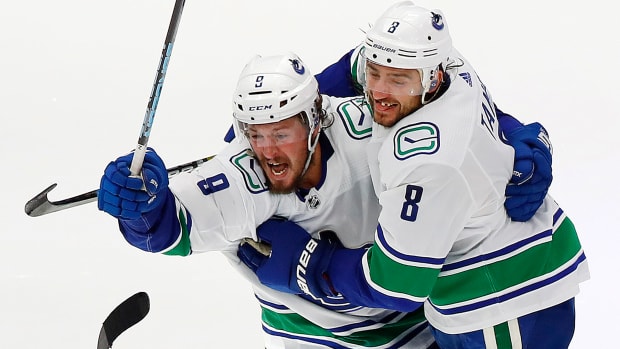Regardless of what happens in the first round, the Canucks have already proven something to themselves and the hockey world. And the lessons they're learning now will make them better in the long run.
With everything that has happened this season, it’s easy to forget that the Vancouver Canucks turned 50 in 2019-20. But instead of developing a paunch, losing their hair and screaming at those rotten kids to get off their lawn, the Canucks are looking young and spry and ready to launch.
It has been nine long years since the Canucks last won a playoff series, going way back to their run to the Stanley Cup final in 2011. The only vestige remaining from that team was defenseman Chris Tanev, a little-used rookie in 2011 who provided the heroics by scoring 11 seconds into overtime to give the Canucks a 5-4 overtime victory over the Minnesota Wild and a pass to the real playoff marathon.
“I actually picked him in the pool to score,” joked Canucks coach Travis Green, “so I’m happy about that.”

Green actually had a lot more than that to be happy about after watching his team take three straight games after losing the first game of the series 3-0. The Canucks had 10 players and a coach who had never participated in an NHL playoff game before this series and there’s something about seeing a group grow up before your very eyes that is special. But it wasn’t as much that they won the series, but how they were able to do it. They not only lost the first game of the series, they failed to score a goal and watched as their star player was abused with impunity. Those are the kinds of things that can destroy the confidence of a young group. They went out and got Tyler Toffoli at the trade deadline to help them in these situations and lost him after Game 1. And in Game 4, they suffered a number of breakdowns to give the Wild a 3-1 lead in the game, but battled back and did not back down. And they won one for their goaltender Jacob Markstrom, who had an uncharacteristically shaky game. That’s huge.
“I really thought that (Game 1) loss was more devastating than a regular playoff loss when you just roll into the playoffs, because of the build-up,” Green said. “I felt like we had to pick our team up off the mat a little bit.”
Thanks to the omnipresent first-round playoff upset, the Canucks have vaulted to the fifth seed in the Western Conference, which means they’ll take on the loser of the round-robin game Sunday between the St. Louis Blues and Dallas Stars. Now the real fun begins. But regardless of what happens in the first round of the playoffs, it’s clear this is a team that is on the rise in the long-term.
Elias Pettersson is learning on the fly that the playoffs are an entirely different beast and for reasons nobody can really properly explain, as an elite player he has to expect to be targeted with all kinds of physical abuse and play through it. He did an outstanding job of that, simply picking himself up without complaint and playing through it. Brock Boeser is learning that the more he goes to the dirty areas, the more success the Canucks are going to have. And Quinn Hughes continues to learn what he was picking up all through a season that could end up with him winning the Calder Trophy. And that is that he has the chops to be a legitimate star in this league, not just a very good defenseman. The Canucks learned in Game 4 that they don’t have to be saved by their goaltending every game. And Green learned what it’s like to see a young group with long faces and a day off and what it takes to prepare them for the next challenge.
In short, they’re learning exactly what it takes to be a winning team.
The lessons will continue in these playoffs, regardless of how the Canucks fare against either the defending champion Blues or the veteran-laden Stars. The test will be formidable and it will be daunting. And the Canucks may not be able to get over that hump right now. But the lessons will continue to pile up, which will make this group better and more battle hardened in the long run.
“This is a group that learns quickly, they learn on the fly,” Green said. “Coaching this group is enjoyable. They let you coach them and they listen and they buy in as a group and that’s what you want out of them.”